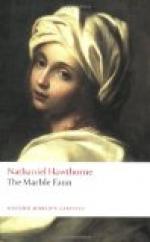Yet they were not so miserably poor but that the grown people kept houses over their heads.
In the way of food, they had, at least, vegetables in their little gardens, pigs and chickens to kill, eggs to fry into omelets with oil, wine to drink, and many other things to make life comfortable. As for the children, when no more small coin appeared to be forthcoming, they began to laugh and play, and turn heels over head, showing themselves jolly and vivacious brats, and evidently as well fed as needs be. The truth is, the Italian peasantry look upon strangers as the almoners of Providence, and therefore feel no more shame in asking and receiving alms, than in availing themselves of providential bounties in whatever other form.
In accordance with his nature, Donatello was always exceedingly charitable to these ragged battalions, and appeared to derive a certain consolation from the prayers which many of them put up in his behalf. In Italy a copper coin of minute value will often make all the difference between a vindictive curse—death by apoplexy being the favorite one-mumbled in an old witch’s toothless jaws, and a prayer from the same lips, so earnest that it would seem to reward the charitable soul with at least a puff of grateful breath to help him heavenward. Good wishes being so cheap, though possibly not very efficacious, and anathemas so exceedingly bitter,—even if the greater portion of their poison remain in the mouth that utters them,—it may be wise to expend some reasonable amount in the purchase of the former. Donatello invariably did so; and as he distributed his alms under the pictured window, of which we have been speaking, no less than seven ancient women lifted their hands and besought blessings on his head.
“Come,” said the sculptor, rejoicing at the happier expression which he saw in his friend’s face. “I think your steed will not stumble with you to-day. Each of these old dames looks as much like Horace’s Atra Cura as can well be conceived; but, though there are seven of them, they will make your burden on horseback lighter instead of heavier.”
“Are we to ride far?” asked the Count.
“A tolerable journey betwixt now and to-morrow noon,” Kenyon replied; “for, at that hour, I purpose to be standing by the Pope’s statue in the great square of Perugia.”
CHAPTER XXXIV
MARKET DAY IN PERUGIA
Perugia, on its lofty hilltop, was reached by the two travellers before the sun had quite kissed away the early freshness of the morning. Since midnight, there had been a heavy, rain, bringing infinite refreshment to the scene of verdure and fertility amid which this ancient civilization stands; insomuch that Kenyon loitered, when they came to the gray city wall, and was loath to give up the prospect of the sunny wilderness that lay below. It was as green as England, and bright as Italy alone. There was all the wide valley, sweeping down and spreading away on all sides from the weed grown ramparts, and bounded afar by mountains, which lay asleep in the sun, with thin mists and silvery clouds floating about their heads by way of morning dreams.




